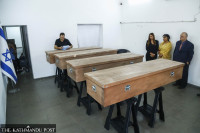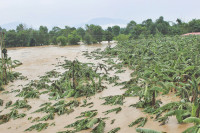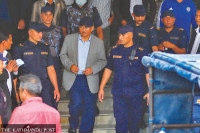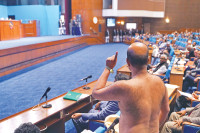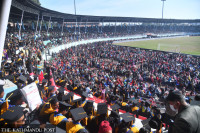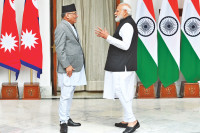Politics
Yearender 2022: A year of geopolitical significance
The year gone by also saw a series of high-level visits from India, the United States and China.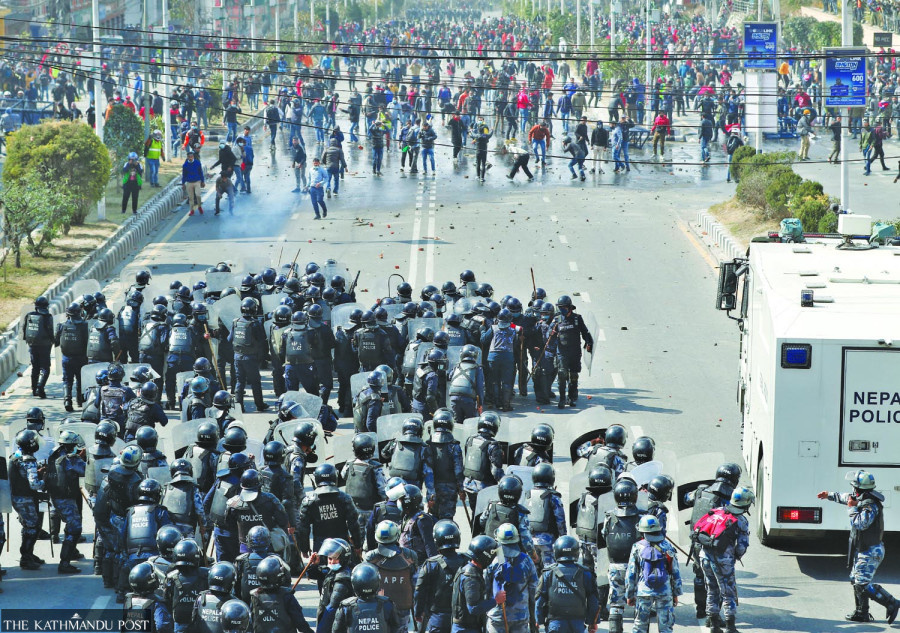
Anil Giri
The year 2022 has become history, and in the 12 months gone past, the executors of Nepal's foreign policy have left some significant and crucial memories for those following the course of its international relations.
The year began with Kathmandu’s dilemma over whether or not to ratify the Millennium Challenge Corporation Nepal Compact, a $500 million American grant, amid deep divisions within the political parties and the general public.
The MCC had become a politically charged issue, and due to the circulation of various kinds of information and disinformation, particularly on social media, the political class was deeply divided.
Throughout the month of January, the ruling alliance led by the Nepali Congress and the main opposition, the CPN-UML, did little else except pass blame back and forth.
But when a letter jointly written by then Prime Minister Sher Bahadur Deuba and newly appointed prime minister and chairman of the CPN (Maoist Centre) Pushpa Kamal Dahal to MCC headquarters in Washington, DC was exposed, it became the turning point in ending the MCC saga.
In the letter sent on September 29 to MCC headquarters, both Deuba and Dahal had pledged that they would build consensus on the MCC by the end of February and have the pact ratified.
The first ever highly charged geopolitical issue, the MCC saga not only divided the Nepali polity but also created a face-off between Washington and Beijing.
United States Assistant Secretary of State Donald Lu added to the cauldron by telephoning Nepali leaders on February 8 and warning them that Washington would review its relations with Nepal in the event of its failure to ratify the MCC Compact from Parliament by February 28, according to multiple officials familiar with the conversation.
As tensions were intensifying between the ruling and opposition parties and they were looking for ways to ratify the MCC, the Chinese Foreign Ministry made a remark that gave a new geopolitical colour to the proposed US aid. On February 24, a Chinese Foreign Ministry spokesperson in Beijing asked how a "gift" could be offered with an ultimatum.
“How could a ‘gift’ be sent by an ultimatum? How could people accept such a ‘gift’? Is it a ‘gift or a Pandora's box?’ Is it afraid that just as the old Nepali saying goes, it looks delicious, but it's actually a meat tough to chew,” said Hua Chunying in Beijing.
This was probably the first time in Nepal’s history that big powers like the US and China had faced off over a US grant.
The US and China have differences over issues like Tibetan refugees, political and social systems like democracy, human rights and rights of minorities.
"Geopolitics has become a predominant factor in the conduct of our foreign policy," said Madhurama Acharya, former foreign secretary and ambassador, "and our maximum efforts, time and energy have been invested in big-power management and balancing geopolitics and the clash of interests that emerges from the geopolitical interests and competitions."
After the end of the MCC story, Nepal got caught in a dilemma over the ongoing Russia-Ukraine war.
During a vote in the United Nations General Assembly on March 2, Nepal, while deploring the attack against Ukraine by Russia, voted in favour of a UN resolution on the Ukraine crisis.
Some left-leaning political party leaders and public intellectuals said Nepal had tilted towards the Western bloc by voting against Russia when immediate neighbours India and China had abstained.
Dispelling suggestions of a Western tilt following the MCC ratification and vote against Russia, then Foreign Minister Narayan Khadka clarified that standing in support of Ukraine did not mean taking sides, as Nepal had always been for world peace and respect for the sovereignty and territorial integrity of small nations.
In the midst of these new geopolitical frictions, Chinese Foreign Minister Wang Yi, who is also the state councillor, visited Kathmandu at the end of March.
From grass to railway and vaccines to economic and technical cooperation, Nepal and China signed nine agreements and documents, but none on the Belt and Road Initiative with officials saying that more negotiations were needed to implement it.
As soon as the Chinese minister wrapped up his Nepal visit with mixed signals and inputs, Deuba paid his first official visit to India when he also visited the Bharitya Janata Party headquarters which created a storm back home.
Four different agreements were signed including the Nepal-India Joint Vision Statement on the Power Sector which both sides hailed as a reboot of their bilateral ties.
The year gone by also saw a series of high-level visits from India, the US and China.
After the visits of Deuba to India and the Chinese foreign minister to Kathmandu, the US sent a bipartisan Congressional delegation to Kathmandu on April 23, followed by the Under Secretary for Civilian Security, Democracy and Human Rights Uzra Zeya on May 20.
Before her visit to Kathmandu, Indian Prime Minister Narendra Modi travelled to Lumbini which was his fifth visit to Nepal after becoming prime minister of India.
The first was in 2014. Deuba's visit to India and Modi’s visit to Lumbini were also an opportunity for the two sides to dispel misunderstandings and begin new partnerships, particularly in the energy sector.
Zeya’s visit to Kathmandu was keenly followed in Beijing which expressed displeasure over her visit to Tibetan camps in Kathmandu.
Kathmandu was hit by another geopolitical storm after the visit of Commanding General of the US Army Pacific Charles Flynn who urged Prime Minister Deuba to join the State Partnership Programme (SPP) of the US government.
During Flynn's stay in Kathmandu, which lasted from June 27 to July 1, he pushed for the signing of the SPP which triggered a new debate in Kathmandu and divided political circles, party leaders and parliamentarians.
Like during the MCC episode, one document after another was leaked on the SPP, including Nepal’s request to become part of the MCC in October 2015.
The American programme was debated in Parliament, and the foreign minister and the army chief were grilled by the House committee where they were told not to sign the US military and security initiative that would create a geopolitical risk.
Subsequently, the government decided to stay away from the SPP, and made public the position that Nepal would not be part of the SPP, now or in the future.
As soon as the SPP saga was about to die down, Liu Jianchao, the new head of the International Liaison Department of the Communist Party of China, visited Kathmandu and discussed a wide range of issues.
Relations with India became “prickly” after Nepal refused to allow its youths to be recruited in the Indian Army under the Agnipath scheme.
Nepali youths since 1947 have been recruited in the Indian Army, and for the first time, the process of recruitment has been halted.
"In or outside the country, the year gone by was not that encouraging for global peace or the economy," said Rajeshwor Acharya, former Nepali ambassador to China. "Our relations with India and China also could not gain warmth."
Despite reservations from the Ministry of Foreign Affairs, the decision of President Bidya Devi Bhandari to address a function of the China-led Global Security Initiative also attracted controversy.
And the visit to Kathmandu of Li Zhanshu, chairman of the Standing Committee of the National People’s Congress of China, also demonstrated that Kathmandu's moves were being constantly watched by Beijing.
"Where were the Foreign Ministry and the foreign minister when Beijing and Washington were facing off over the MCC and other issues of geopolitical significance?" said Acharya.
Controversy in the country over the SPP ultimately killed Deuba's planned US visit.
“Since China is growing as the second largest military and economic power, we should not ignore its importance. The role of the Foreign Ministry was not satisfactory when China and the US were confronting each other. Saarc is not moving ahead, Sri Lanka and Europe are in crisis, and the entire world suffered one stress after another in the previous year,” said Acharya.




 8.85°C Kathmandu
8.85°C Kathmandu
